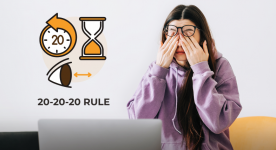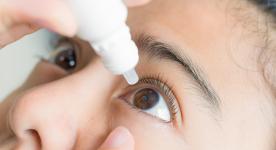Household Tips To Keep Our Eyes Healthy - The “Feng-Shui” For Your Dry Eye
The words Feng Shui have Chinese origins and translate to "wind" and "water”. It is a practice of arranging the pieces in living spaces in order to create balance with the natural world. Daily life and dry eye syndrome are closely related. Most of us spend significant time at home and this home-time is getting more nowadays when people start to work and learn from home. This “feng shui” theory kind of fits with the environmental and lifestyle modification that we can adopt to prevent or reduce the burden of dry eye diseases.
1. The “Feng” (wind):
Exposure to dry and strong wind creates an unfriendly environment for the ocular surface because it will speed up the evaporation of tears. This will lead to the evaporative dry eye disease as one of the major components in dry eye. Avoid pointing the fan and the air outlet of the air conditioner in the direction of the face/eyes.

2. The “Shui” (water):
Keeping your body hydrated can reduce symptoms of dry eye. When the body is dehydrated, it will indeed affect the production of tears.
Dry air will increase the evaporation of tears. You can use a humidifier to reduce air drying at home to improve the retention of natural tears in your eyes.

3. The art of arranging things:
First is about the arrangement of your work desk. Put your chair and yourself at an arm-length working distance from laptops and computers. Place the screen a little below eye level. This slight down gaze position reduces the amplitude of eyelid opening and reduces tear evaporation (but at the same time pay attention to the posture of the neck).
When concentrating on the screen, remind yourself to blink regularly. The normal frequency of blinking is about the same as our breathing rate, 16-18 times a minute.
Second is the adjustment of the environment and the screen lighting. Try to work under natural or ambient light or adjust the screen brightness to match the level of room light. You can make good use of the automatic light adjustment function of the computer/mobile phone for appropriate lighting. Using "dark" or "night" mode on the device at night also helps.
There are two more things that you can do at home when you need to stick to the screen for work, class, or entertainment. Home time is a good time for multitasking (if you agree).
1 Take regular breaks using the "20-20-20" rule: after using your eyes at close range for 20 minutes, you should let your eyes rest and look at things 20 feet away for more than 20 seconds to relieve eye fatigue/overfocus.
2 Applying hot compression to the eyelid once or twice a day can relieve eye muscle fatigue and improve the secretion of oil to stabilize your tears.
Last but not least, step out daily from your home-sweet-home for outdoor activity, which is especially important for the visual development of kids, and to keep up the healthy weight and active lifestyle.
Lecturer, Ophthalmologist & Corneal Fellow
Department of Ophthalmology, Faculty of Medicine, Universiti Kebangsaan Malaysia
Consultant Ophthalmologist
Sunway Specialist Centre Damansara
B-G-1, B-G-2, B-G-3, Sunway Nexis Retails, Jalan PJU 5/1, Kota Damansara, 47810 Petaling Jaya, Selangor
Five‐item Dry Eye Questionnaire (DEQ-5).
관련 게시물
Five‐item Dry Eye Questionnaire (DEQ-5).









